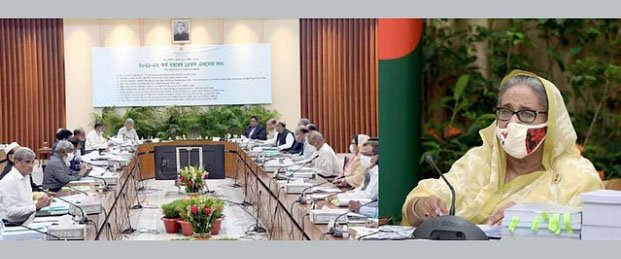Bangladesh News Desk: The Executive Committee of the National Economic Council (ECNEC) Tuesday approved a total of 11 projects costing Tk over 45.41 billion, including one for empowering the country’s womenfolk through technological support with Tk over 2.5 billion, reports BSS.
The approval came from the 14th meeting of the ECNEC in the current fiscal year (FY22) with its Chairperson and Prime Minister Sheikh Hasina in the chair.
The Premier joined the meeting virtually from her official Ganabhaban residence while ministers, state ministers, planning commission members and secretaries concerned attended the meeting from the NEC Conference Room in the city’s Sher-e-Bangla Nagar area.
Briefing reporters after the meeting, planning minister MA Mannan said that a total of 11 projects were approved today, Tuesday, involving an overall estimated cost of Tk over 45 billion while the entire project cost would come from the state coffer.
Of the approved 11 projects, six are new while the rest five projects are revised ones. Revealing some of the directives from the premier, the planning minister said that the prime minister had directed all the authorities of the concerned city corporations to become self-reliant gradually instead of depending on the government.
Mannan informed that the premier directed the Rural Development and Cooperatives Division to gradually expand the operations of milk-based cooperatives in the milk deficit upazilas to meet the growing demand for protein.
Supplementing on the issue, state minister for planning Shamsul Alam said that Sheikh Hasina also stressed the need for agro-processing initiatives side by side producing ghee, powder milk and cheese from milk where the private sector initiatives could be highly encouraged.
Referring to the approval of a project in Mymensingh City Corporation, Mannan said the Premier gave a strong order for having sound waste management adding that CETP or ETP should be in place so that no waste is poured into the rivers.
He said that the prime minister is highly concerned about the environmental issue adding that CETPs and ETPs should be established where industries are mushrooming.
Shamsul Alam supplemented that the Premier stressed that the National River Protection Commission should have a close vigil so that the riversacross the country are not polluted.
He also informed that Sheikh Hasina while giving approval to the project for empowering the womenfolk unrecorded that the women get proper training in a true sense so that they could become self-reliant.
Answering to a question about the reoccurrence of revision of Development projects, the Planning Minister said that the government has been trying relentlessly to come out of such a trend by applying better technology and knowledge.
But, he acknowledged that the COVID-19 pandemic which was an unforeseen event affected the project implementation process to some extent. Besides, the Russia-Ukraine war is also ongoing, he added.
Mannan, however, informed that despite the war and the pandemic, the work of Rooppur nuclear power plant project is on track alongside the Matarbari power plant and others.
Replying to another question, he said that corruption might take place at an individual level to some extent, but according to his knowledge, there is no corruption at the institutional level.
The planning minister said that the recent Cabinet decision of building elevated roads in the haor areas would be a ‘game changer’ and the government is very much committed to it. There will be no more all-weather roads, he added.
He told another questioner that due to the relentless and massive development initiatives of this proactive Awami League government, there is so much rush and gathering on the roads and highways with increased traffic.
Mannan informed that the ECNEC was also apprised of the approval of a project for turning the historic Rose Garden into a museum.
Replying to a question, Dr Alam said that Bangladesh is in a safe zone in debt repayment as the country did not fail in repaying loans in its 51-year history.
Revealing the rate of implementation of the Revised Annual Development Programme (RADP) during the July-March period of the current fiscal year (FY22), Mannan said that the rate is 3.64 per cent higher than the corresponding period of the previous fiscal year (FY21).
The RADP implementation rate during the July-March period was 45.56 per cent with an expenditure of Tk over 105.34 billion whereas the RADP implementation rate during the July-March period of the last fiscal year was 41.92 per cent with an expenditure of Tk over 94.35 billion.
Mannan said that the RADP implementation rate has increased during this nine- month period due to the sound management of the government despite the pandemic alongside the hard work of the common people.

